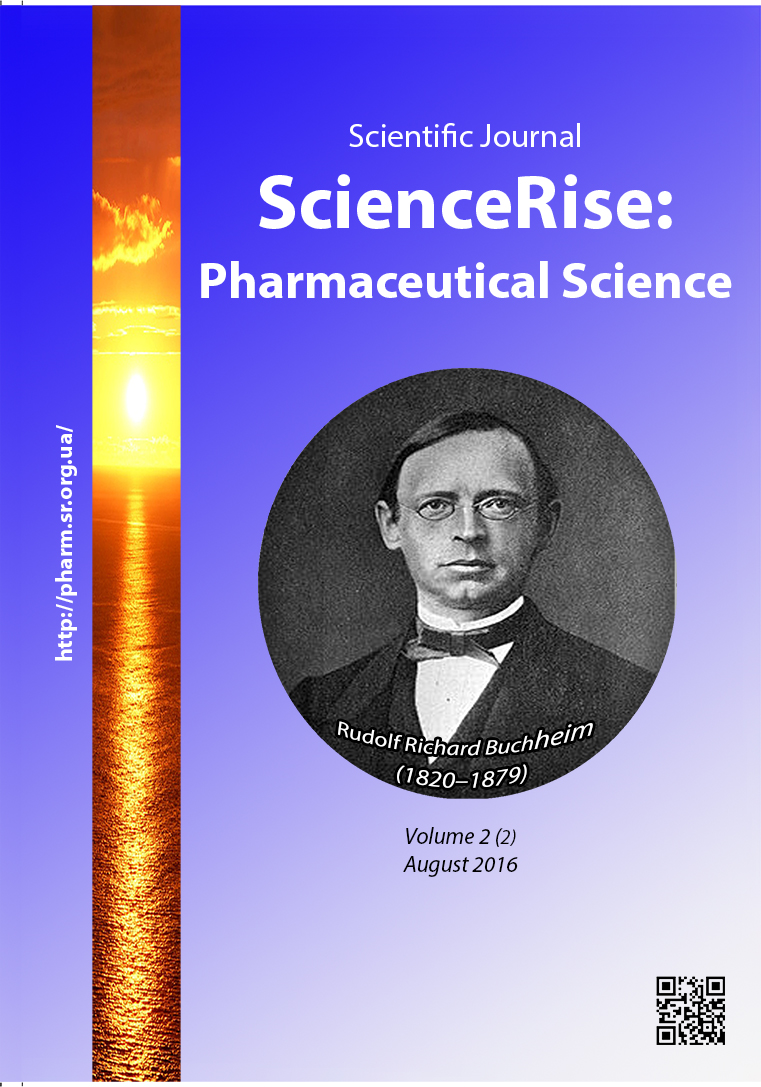The study of the volatile fractions composition from narrow-leaved catoptric (Typha Angustifolia L.) raw material
DOI:
https://doi.org/10.15587/2519-4852.2016.76372Keywords:
Narrow-leaved catoptric, leaves, fruit, rhizomes with roots, volatile compounds, gas chromatographyAbstract
Narrow-leaved catoptric is wide spread in many countries, particularly, in Ukraine. The given herb is used for treatment of many diseases, e.g. cystitis, urethritis; it is also used as an antioxidant, anti-sclerotic and haemostatic agent. In Ukraine, Narrow-leaved catoptric is non-officinal herb; therefore, it needs complex pharmacognostical research.
The aim of our research was the study of the volatile fractions composition of Narrow-leaved catoptric leaves, fruit and rhizomes with roots.
Methods. Gas chromatography method was used for the analysis of the volatile fractions composition of leaves, fruit and rhizomes with roots of Narrow-leaved catoptric.
Results. In result of research, 20 components were determined in the volatile fraction composition of Narrow-leaved catoptric leaves, 26 – in Narrow-leaved catoptric fruit, and 14 – in Narrow-leaved catoptric rhizomes with roots. Composition of all research objects is mainly represented by paraffin hydrocarbons, aldehydes and fatty acids esters. In the volatile fraction of Narrow-leaved catoptric rhizomes with roots the presence of sulfur-containing compounds was determined.
Conclusion. Results of the experiment can be used for development and manufacturing of new phytotherapeutic remedies on the basis of Narrow-leaved catoptric raw materialReferences
- Kumar, J., Sheel, R. (2012). Suitability and utility value of typha angustifolia Linn. For cultivation in north bihar countryside wetlands. Indian Journal of Fundamental and Applied Life Sciences, 2 (2), 234–238.
- Infectious diseases. WHO. Available at: http://www.who.int/topics/infectious_diseases/en/
- Londonkar, R. L., Madire Kattegouga, U., Shivsharanappa, K., Hanchinalmath, J. V. (2013). Phytochemical screening and in vitro antimicrobial activity of Typha angustifolia Linn leaves extract against pathogenic gram negative micro organisms. Journal of Pharmacy Research, 6 (2), 280–283. doi: 10.1016/j.jopr.2013.02.010
- Masoko, P., Mokgotho, M. P., Mbazima, V. G., Mampuru, L. J. (2008). Biological activities of Typha capensis (Typhaceae) from Limpopo Province (South Africa). African Journal of Biotechnology, 7 (20), 3743–3748.
- Inouye, S., Takizawa, T., Yamaguchi, H. (2001). Antibacterial activity of essential oils and their major constituents against respiratory tract pathogens by gaseous contact. Journal of Antimicrobial Chemotherapy, 47 (5), 565–573. doi: 10.1093/jac/47.5.565
- Prabuseenivasan, S., Jayakumar, M., Ignacimuthu, S. (2006). In vitro antibacterial activity of some plant essential oils. BMC Complementary and Alternative Medicine, 6 (1). doi: 10.1186/1472-6882-6-39
- Wang, H.-Q., Liang, F., Qiao, N. et. al. (2014). Chemical Composition of Volatile Oil from Two Emergent Plants and Their Algae Inhibition Activity. Pol. J. Environ. Stud., 23 (6), 2371–2374.
- Burda, N. Je., Zhuravel', I. O., Kyslychenko, V. S. et. al. (2010). Analiz efirnoi' olii' travy Filipendula ulmaria (L.) Maxim. Ukrai'ns'kyj medychnyj al'manah, 13 (5), 51–53.
- Voloshyna, A. A., Kyslychenko, V. S., Zhuravel', I. O., Burda, N. Je. (2013). Doslidzhennja komponentnogo skladu letkyh frakcij travy ta kvitok dyvyny zvychajnoi'. Ukrai'ns'kyj medychnyj al'manah, 16 (2), 19–21.
- Chernogorod, L. B., Vinogradov, B. A. (2006). Jefirnye masla nekotoryh vidov roda Achillea L., soderzhashhie fragranol. Rastitel'nye resursy, 42 (2), 61–68.
Downloads
Published
How to Cite
Issue
Section
License
Copyright (c) 2016 Євгеній Олександрович Довгаль, Ірина Геннадіївна Гур’єва, Вікторія Сергіївна Кисличенко, Ірина Олександрівна Журавель

This work is licensed under a Creative Commons Attribution 4.0 International License.
Our journal abides by the Creative Commons CC BY copyright rights and permissions for open access journals.







